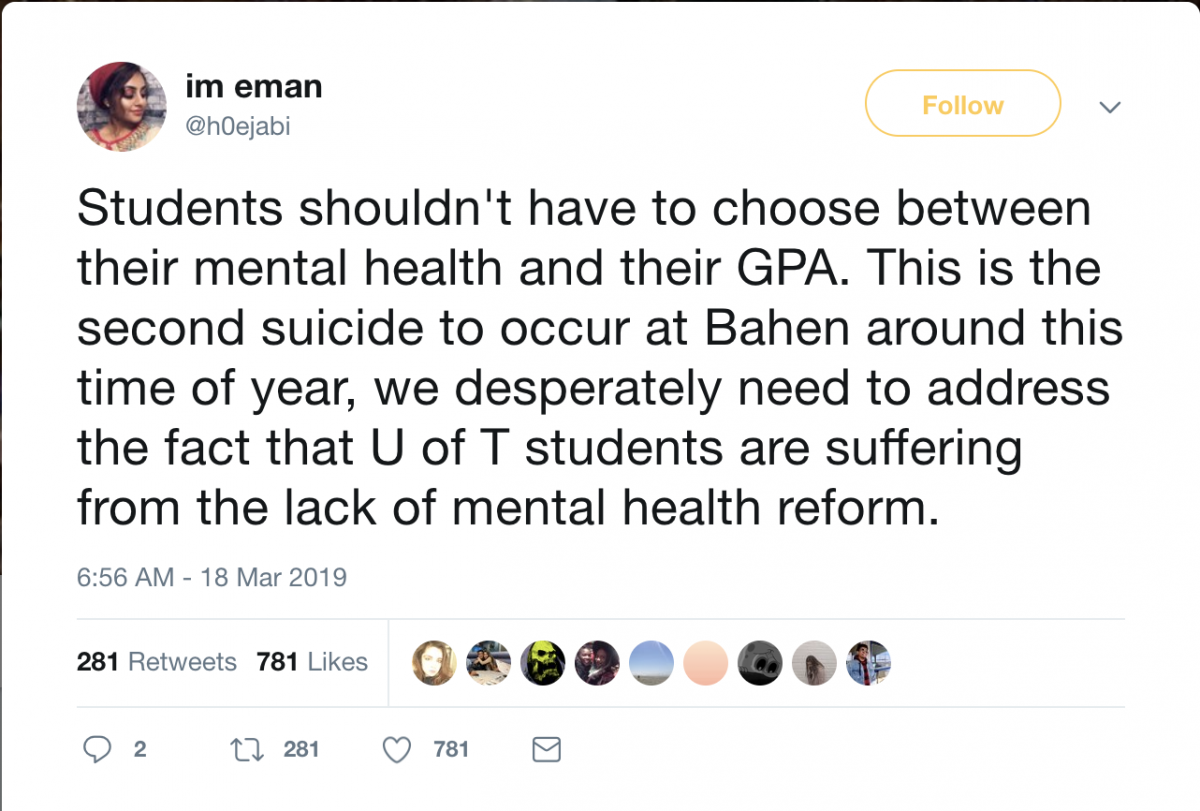A recent suicide over the weekend at the University of Toronto has raised concerns among students about the availability of mental health resources on campus. The student was found dead on the first floor of the Bahen Centre of Information and Technology at the university’s downtown campus. It was the third reported suicide on campus during this academic year.
An official statement was released by U of T to inform students that there was nothing suspicious about the suicide. Students blame the university’s lack of comprehensive mental health services for these tragedies, referring to it as a “toxic campus environment.”
Aidan Gomez, a former student at U of T stated that the real problem at the university is a cultural and administrative one.
“The administration makes little to no consideration for mental illness (in particular, depression and anxiety are afforded no academic considerations),” he said. “I personally have had requests based on exceptional circumstances of mental well-being (with medical verification and support) denied without justification or opportunity for appeal.
“I feel so disappointed with the sentiment of malaise and distrust it has caused in its student body,” Gomez said. He found the response from the university not only unsatisfactory but also indicative of its continued disinterest in the well-being of its students.
U of T needs to reform its health system
Current students at U of T also believe that the university has failed them and that there needs to be radical and deep reaching changes. According to Sana Rizvi, an International Studies undergrad, it starts with the adequate organization of health centres by the university, so students know where to go for help.
“Many of my friends have called health and wellness and they’re told to wait 3 weeks, and those who have gotten appointments get follow up calls a month later,” she said. “That is completely unacceptable. A lot can happen in one day let alone a month.”
Sheila Rasouli, a third year Neuroscience student, pointed out that the system is inadequate to deal with its growing student population.
“I’ve had many experiences of calling in to make a drop-in appointment 10 minutes after the office opened and being told they already booked up all their drop-in slots for the day,” Rasouli said. “The number of slots it offers fill up almost immediately, so students with a crisis are forced to wait for their appointment to go through.”
The problem doesn’t end there. Students have complained that making the appointment itself can be a hassle, as students who haven’t made appointments have to show up in person before being allowed to make one. However, many students only reach out when they realize they have a problem. As such, it prevents them from making prior appointments and by delaying the intake, the university puts students at more risk than needed.
Students recommend methods for improvement
The university’s president Meric Gertler told CBC that they’re open to listening to students on how to provide better support for mental health. The university has also offered to meet them following Monday’s protest outside Simcoe Hall. Students like Rasouli have begun to take matters into their own hands.
“I emailed university officials with 21 concrete changes to our current mental health system. Currently, with the help of student feedback, that list has grown to 31 actions the university can do to improve student mental health,” she said.
Some of the student suggestions include the following:
- The administration needs to speak to students and hear out student concerns
- The establishment of a body within the office of the ombudsman tasked with critically evaluating the cultural and administrative practices within the university’s colleges and student-facing staff
- Increasing statistical information on student suicides and suicide attempts (As well as mental health on campus).
- Include a lecture in the larger first year courses to inform students about mental health and how to support those in need

Rasouli is in the process of organizing an event in coordination with the UC LIT, UTSU, UTSGU and NCSC (all student representative organizations) to go over these ideas with the general public in a facilitated discussion.
